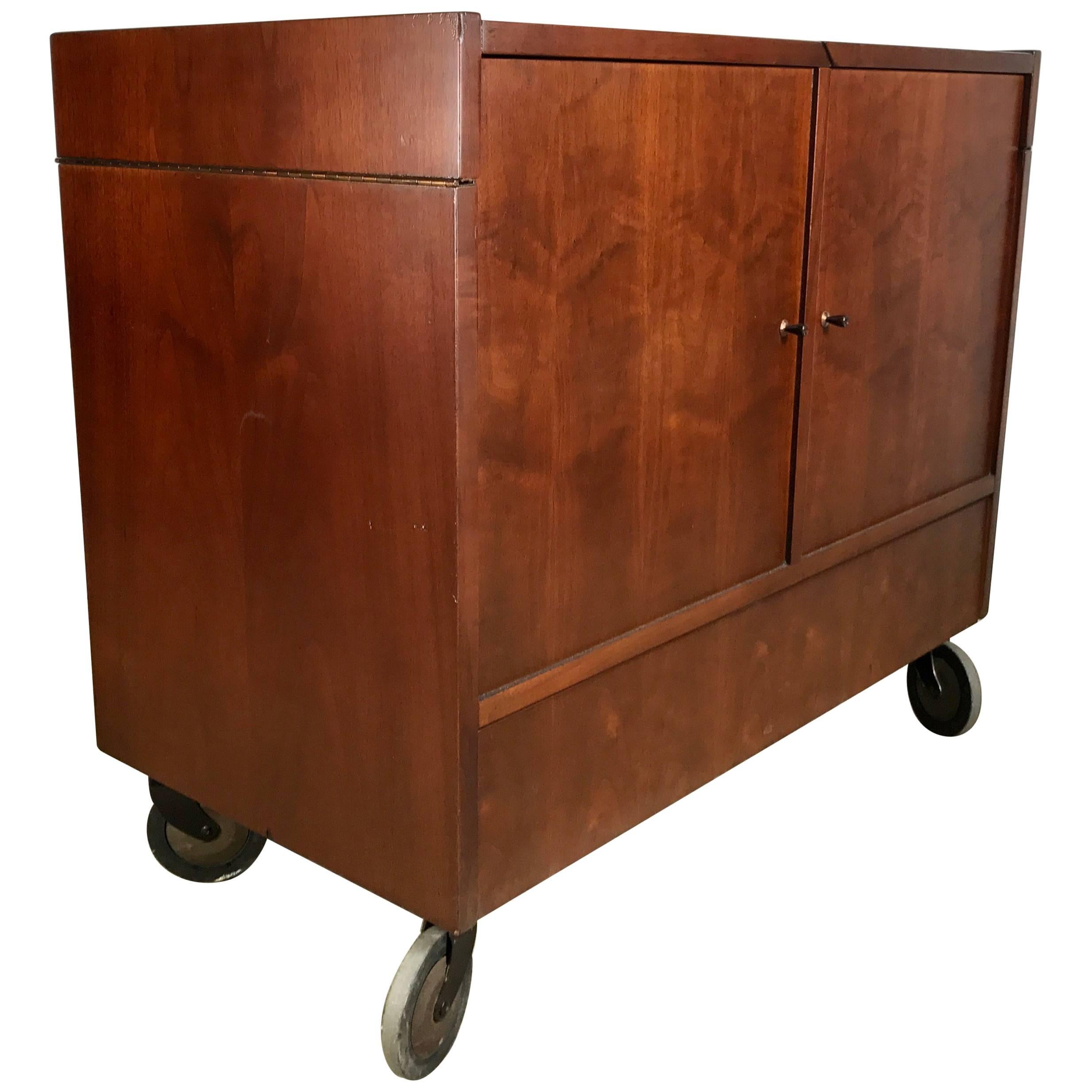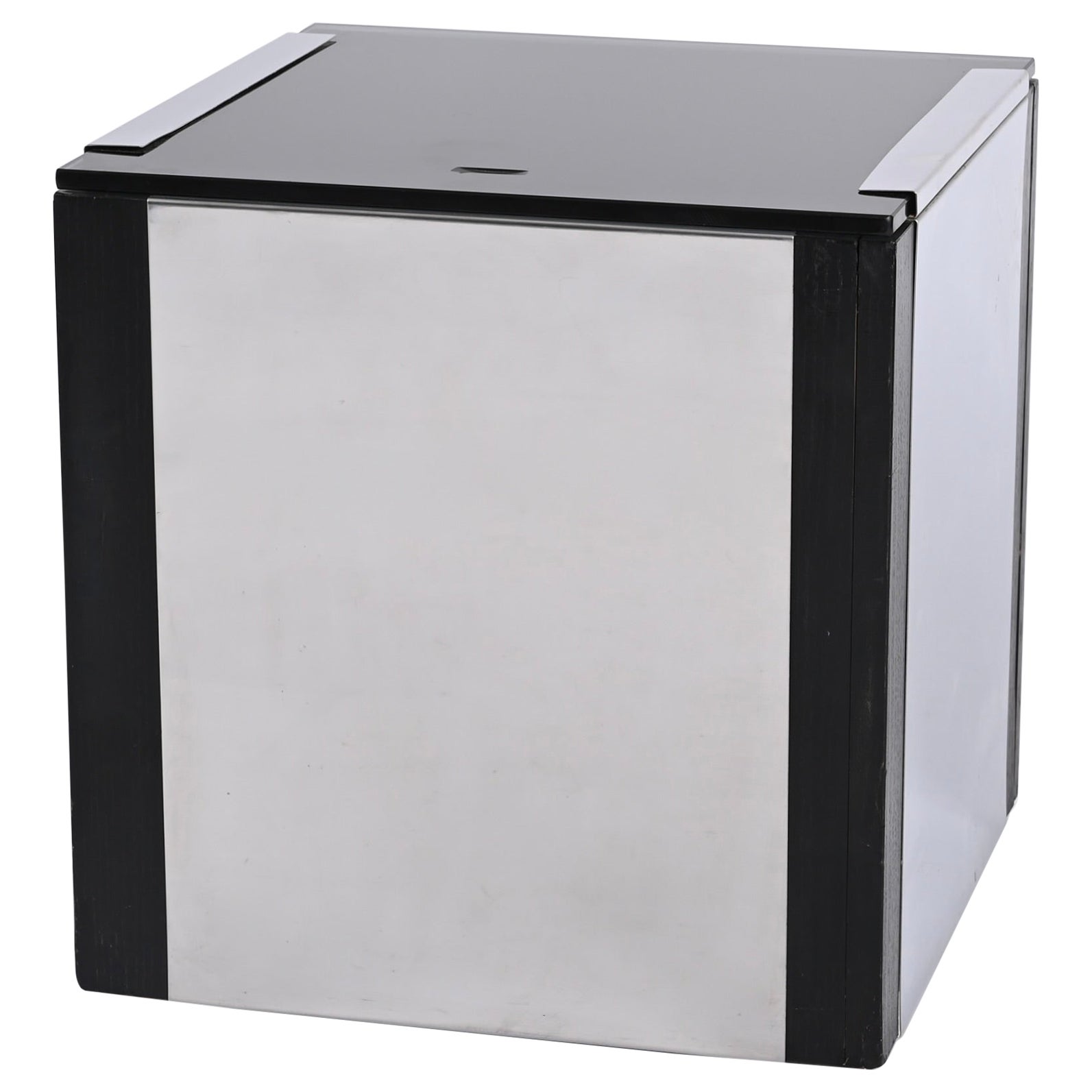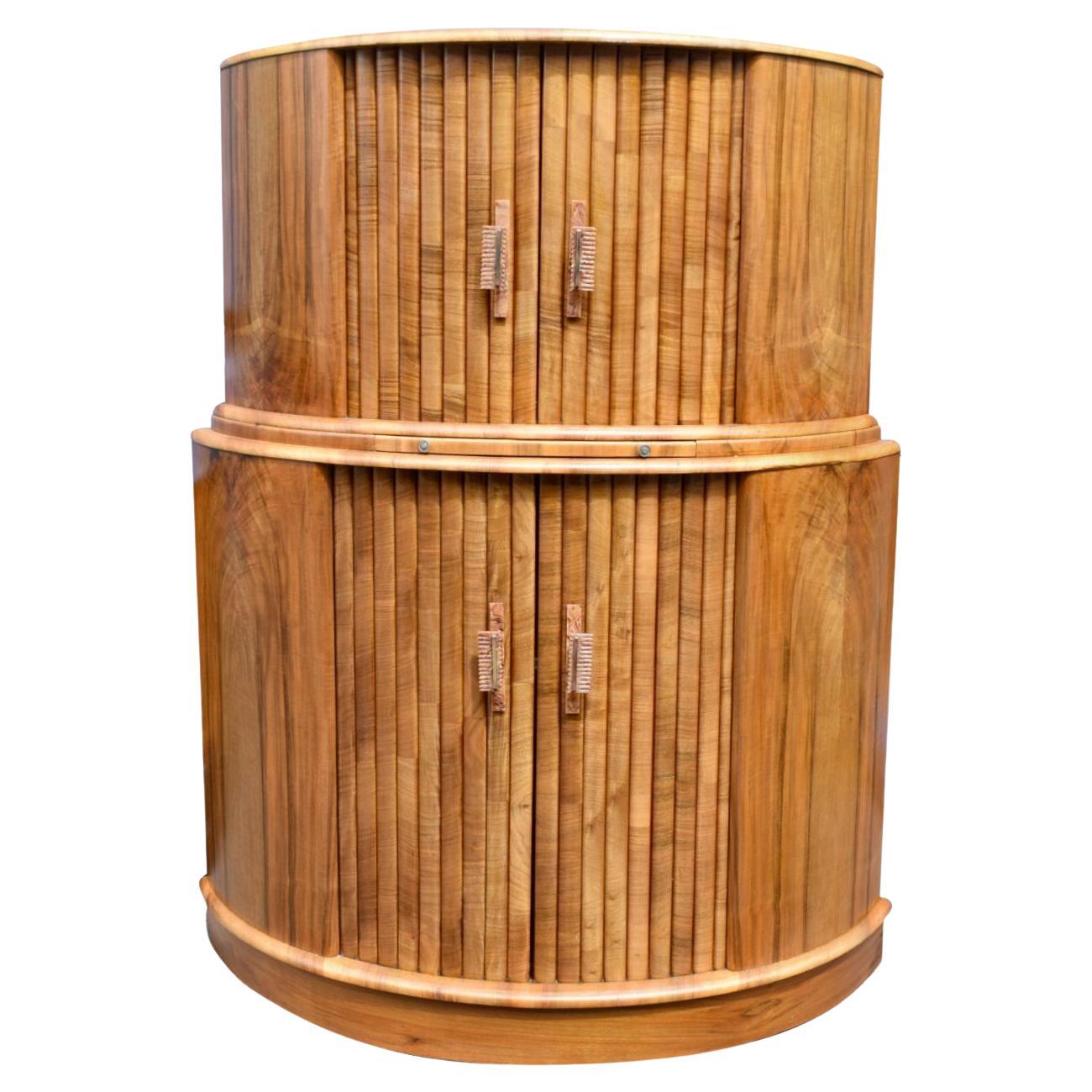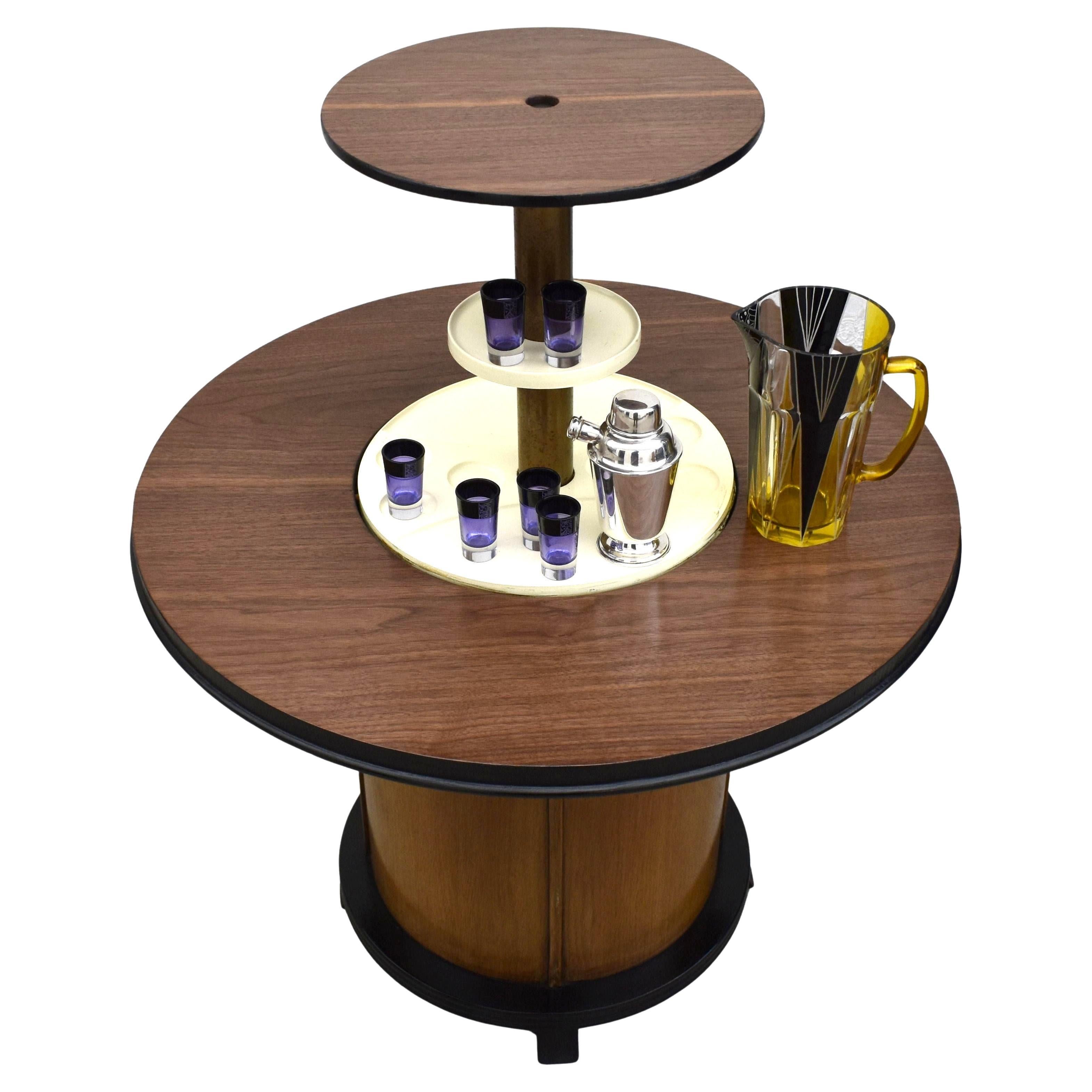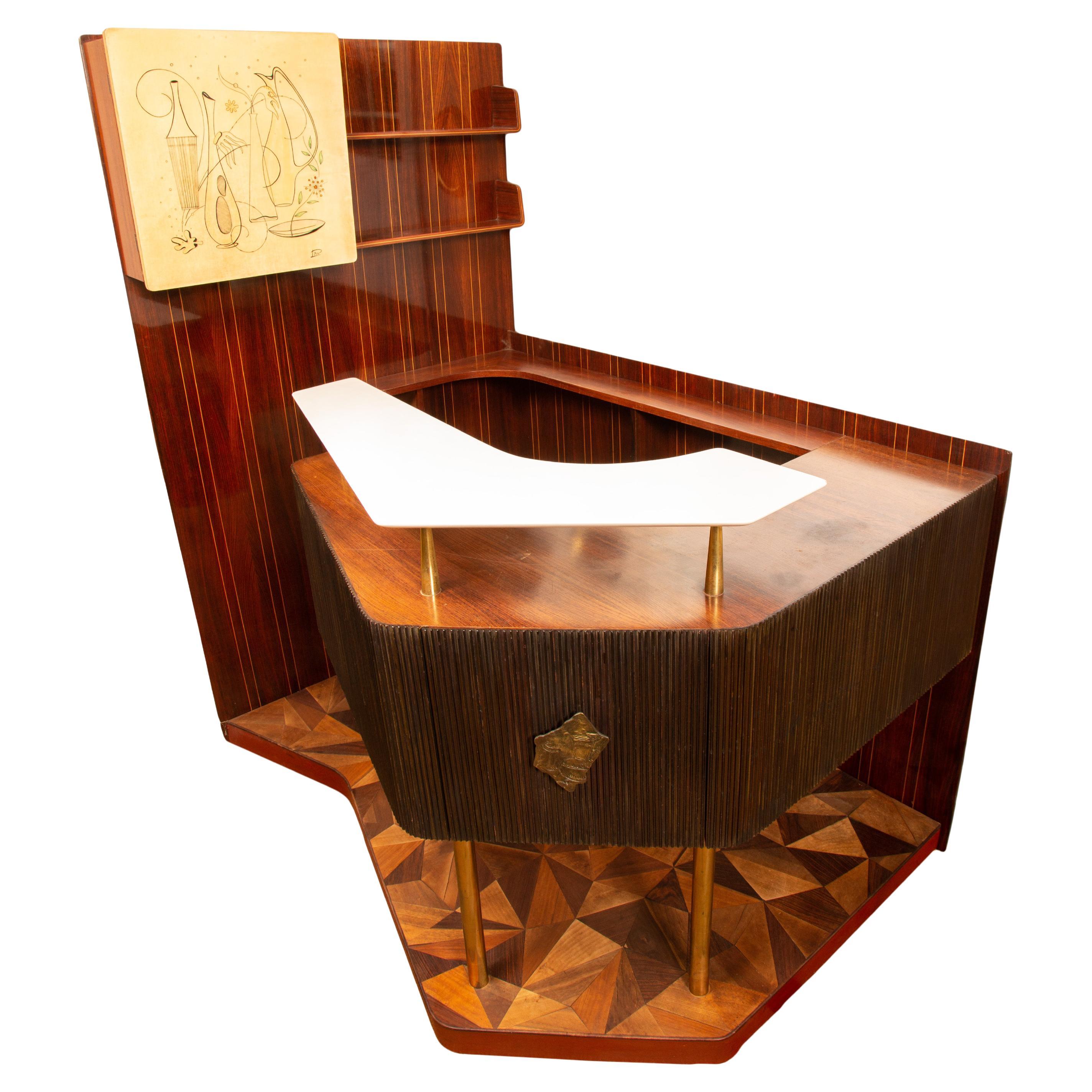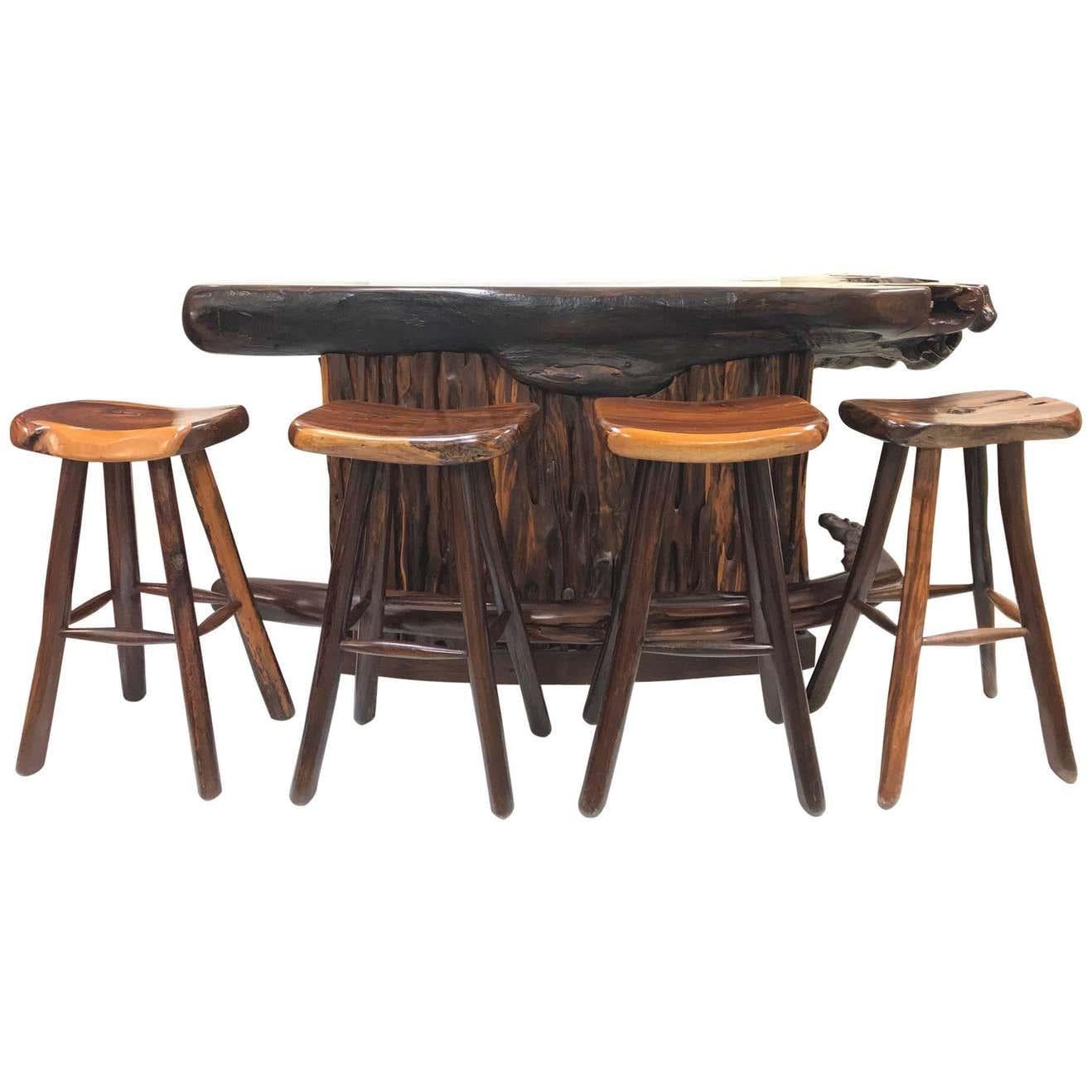Items Similar to Milo Baughman Decor Burl Walnut & Chrome Mid-Century Modern Liquor Serving Bar
Want more images or videos?
Request additional images or videos from the seller
1 of 21
Milo Baughman Decor Burl Walnut & Chrome Mid-Century Modern Liquor Serving Bar
About the Item
Mio Baughman decor burl walnut & chrome Mid-Century Modern liquor serving bar.
- Attributed to:Milo Baughman (Designer)
- Dimensions:Height: 40 in (101.6 cm)Width: 48 in (121.92 cm)Depth: 16 in (40.64 cm)
- Style:Mid-Century Modern (Of the Period)
- Materials and Techniques:
- Place of Origin:
- Period:
- Date of Manufacture:circa 1970s
- Condition:Wear consistent with age and use. Mint vintage condition.
- Seller Location:Rockaway, NJ
- Reference Number:1stDibs: LU883731329282
About the Seller
4.8
Platinum Seller
These expertly vetted sellers are 1stDibs' most experienced sellers and are rated highest by our customers.
Established in 2006
1stDibs seller since 2009
2,018 sales on 1stDibs
Typical response time: <1 hour
- ShippingRetrieving quote...Ships From: Hardwick, NJ
- Return PolicyA return for this item may be initiated within 1 day of delivery.
More From This SellerView All
- Mid Century Modern Chrome Lucite Bar with Two Bar StoolsBy Milo BaughmanLocated in Rockaway, NJVery nice quality mid-century modern design bar with two matching bar stools.Category
20th Century American Mid-Century Modern Dry Bars
MaterialsLucite
- Teak Danish Modern Petit Serving Credenza on Wheels Bar Liquor Cabinet DresserBy Arne Vodder, Hans J. WegnerLocated in Rockaway, NJTeak Danish Modern petit serving credenza on wheels bar liquor multi function universal cabinet dresser by G. Jensen Mint.Category
20th Century Danish Mid-Century Modern Dry Bars
MaterialsLaminate, Teak
- Pair Burl Walnut Mid Century Modern Milo Baughman Rectangle Wall Mirrors MINT!By Milo BaughmanLocated in Rockaway, NJPair Burl Walnut Mid Century Modern Milo Baughman Rectangle Wall Mirrors MINT!Category
20th Century American Mid-Century Modern Wall Mirrors
MaterialsBurl
- Chrome & Smoked Glass Mid-Century Modern Rolling Serving Cart BarBy Milo Baughman, KnollLocated in Rockaway, NJVery sharp looking Mid-Century Modern serving bar cart on wheels.Category
20th Century Italian Mid-Century Modern Serving Tables
MaterialsChrome
- Style of Milo Baughman Burl Wood Bookmatched Mid-Century Modern Wall Mirror PairBy Milo Baughman, Roland Carter, Lane FurnitureLocated in Rockaway, NJPair of Milo Baughman style burl wood bookmatched Mid-Century Modern wall mirrors, designed by Roland Carter and produced by Lane Furniture as part of their "Alpha" collection.Category
20th Century American Mid-Century Modern Wall Mirrors
MaterialsMirror, Burl
- Pair of Milo Baughman Rosewood and Chrome Mid-Century Modern End Tables StandsBy Milo BaughmanLocated in Rockaway, NJPair of Milo Baughman Rosewood and Chrome Mid-Century Modern End Tables MINT!Category
20th Century American Mid-Century Modern End Tables
MaterialsChrome
You May Also Like
- Classic Mid-Century Modern Portable Rolling Fold Out Bar CartLocated in Buffalo, NYClassic Mid-Century Modern portable rolling fold out bar cart. Beautifully grained walnut wood, top two panels open for glasses and serving, as well...Category
Mid-20th Century American Mid-Century Modern Barware
MaterialsLaminate, Walnut
- Willy Rizzo Midcentury Cubic Chromed Steel, Wood and Glass Dry Bar, Italy 1970sBy Willy RizzoLocated in Roma, ITUnique midcentury cubic dry bar in lacquered ash wood, mirrored steel and glass dry bar with hidden wheels. Willy Rizzo probably produced this incredible piece of barware in Italy during the 1970s. The wheeled bar cart's four sides are in mirrored chromed steel, while the top is in dark smoked glass. It moves thanks to four hidden wheels, and the structure is veneered black lacquered oak. A design masterpiece that will become a cult furniture element in a midcentury bar or living room. Italian designer and photographer Willy Rizzo (1928-2013) first came to prominence in the 1960s as both a chronicler of and participant in La Dolce Vita, the glamorous, jet set lifestyle enjoyed by many international celebrities and socialites in the postwar era. While photography was Rizzo's first love, in the 1970s he developed a passion for interiors and launched a second successful career as a luxury furniture designer. Rizzo was born in Naples in 1928 but moved to France early. After expressing an interest in photography at the age of 12, Rizzo's mother gifted him an Agfa Box camera; soon he was shooting portraits of his classmates at Paris's Istituto Statale Italiano Leonardo Da Vinci. In the 1940s, Rizzo began his career as a photojournalist, working for several French publications, including Ciné Mondial, Point de Vue, and Image du Monde. In the aftermath of the Second World War, Rizzo notably covered the Nuremberg Trials and travelled to Tunisia for Point de Vue to photograph the conflict in North Africa, later published in Life Magazine. As his reputation grew, he was hired by France Dimanche to take portraits of the rich and famous at flashy events like the Cannes Film Festival. Rizzo's charm won the trust of royalty, dignitaries, and movie stars, allowing him to capture these public figures in unusually candid moments. Hoping to advance his career further, Rizzo travelled to New York with Black Star Agency in 1947 to photograph American starlets. When he returned to Paris two years later, he was invited to join Jean Prouvost’s newest publication in colour, Paris Match, as head photographer—a position that he held for 20 years and, along the way, sparked a new culture of celebrity photographers who were as intriguing and fashionable as their subjects. In 1959, he became the artistic director of Marie Claire and collaborated with other fashion magazines, such as Vogue. Throughout his career, Rizzo photographed dozens of stars, including Brigitte Bardot, Maria Callas, Salvador Dalí, Marlene Dietrich, Jane Fonda, Gene Kelly, and Gregory Peck, as well as striking up close friendships with famous personalities like Coco Chanel, Christian Dior, and Jack Nicholson. In 1962, Rizzo famously captured some of the last moments of Marilyn Monroe’s life on film before tragically committing suicide a few weeks later. In 1968, Rizzo married Italian actress Elsa Martinelli, and the pair relocated to Rome. It was here that Rizzo began his work in furniture design, starting with his newly-leased, run-down Roman apartment. Just for personal use (at first), Rizzo created a series one-of-a-kind pieces inspired by modernist icons, such as Mies van der Rohe and Le Corbusier. But as his glitterati friends—Rodolfo Parisi, Gigli Rizzi, Franco Rapetti, Salvador Dalí, Brigitte Bardot, and the like—became admirers of his work, Rizzo was flooded with design commissions. Rizzo went on to furnish apartments for Italian aristocracy in the Palazzo Borghese and Palazzo Ruspoli that same year and quickly earned an international reputation as a designer to the rich and famous. In response to ever-growing demand, he launched his own Tivoli-based company dedicated to contemporary furniture design handmade in lux materials such as wood, marble, stainless steel, brass, and wild boar. Over time, his team of eight grew to 150, and he was able to open shops in France and throughout Europe, as well as in New York, Miami, and Los Angeles. With an emphasis on clean lines and geometric forms, Rizzo's tables, chairs, and accessories combined contemporary shapes with traditional materials—in contrast to many of his contemporaries, like Ettore Sottsass and Vico Magistretti, who were popularizing plastic, foam, and other synthetics in furniture production. Rizzo's most successful designs are many low, box-like tables in granite, metal, glass, or burled wood, often embellished with brass or chrome accents or built-in liquor cabinets or trays. Two examples of his most celebrated designs include the Alveo Coffee Table (1970s) for Mario Sabot and the circular Yin Yang Coffee Table...Category
Vintage 1970s Italian Mid-Century Modern Barware
MaterialsSteel, Metal, Chrome
- Art Deco Walnut Cocktail Cabinet, Dry Bar, English, circa 1930Located in Devon, EnglandGorgeous and original 1930s Art Deco cocktail cabinet in figured walnut. This cabinet really is stunning, featuring a storage area for bottles at the bottom and glasses etc. at the t...Category
Mid-20th Century English Art Deco Dry Bars
MaterialsGlass, Mirror, Bakelite, Walnut
- Art Deco Walnut Pop Up Cocktail Drinks Dry Bar Table, circa 1930Located in Devon, EnglandFor your consideration is this rather fun and stylish original Art Deco English pop up cocktail table. When closed all you need do is press a cen...Category
Mid-20th Century English Art Deco Barware
MaterialsMetal
- Italian Bar by Cantú ItalyBy CantuLocated in New York, NYRare high-style Italian drybar cabinet made by La Permanente Mobili Cantu in the 1950s. The drybar is made of Macassar wood veneer and features a modern...Category
Mid-20th Century Italian Mid-Century Modern Dry Bars
MaterialsMetal, Bronze
- Rare Rosewood Bar and StoolsLocated in New York, NYRosewood bar and stools. The back has sliding doors with shelves. Bar has wheels for easy moving around. Stools measure: 31.25 H x 14 D x 18 W.Category
Vintage 1960s Mid-Century Modern Dry Bars
MaterialsRosewood
Recently Viewed
View AllMore Ways To Browse
Vintage Glass Decor
Baughman Burl
Milo Burl
Milo Baughman Burl Furniture
Milo Baughman Burl
Midcentury Modern Baughman Glass
Mid Century Chrome Glass Bar
Burl Walnut Modern
Milo Baughman Chrome Glass
Liquor Bars
Milo Baughman Chrome And Glass
Liquor Bar
Mid Century Walnut Decor
Vintage Liquor Glass
Mid Century Liquor
Mid Century Modern Liquor
Mid Century Liquor Glasses
Modern Liquor Glasses
